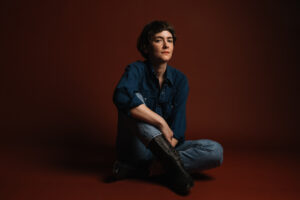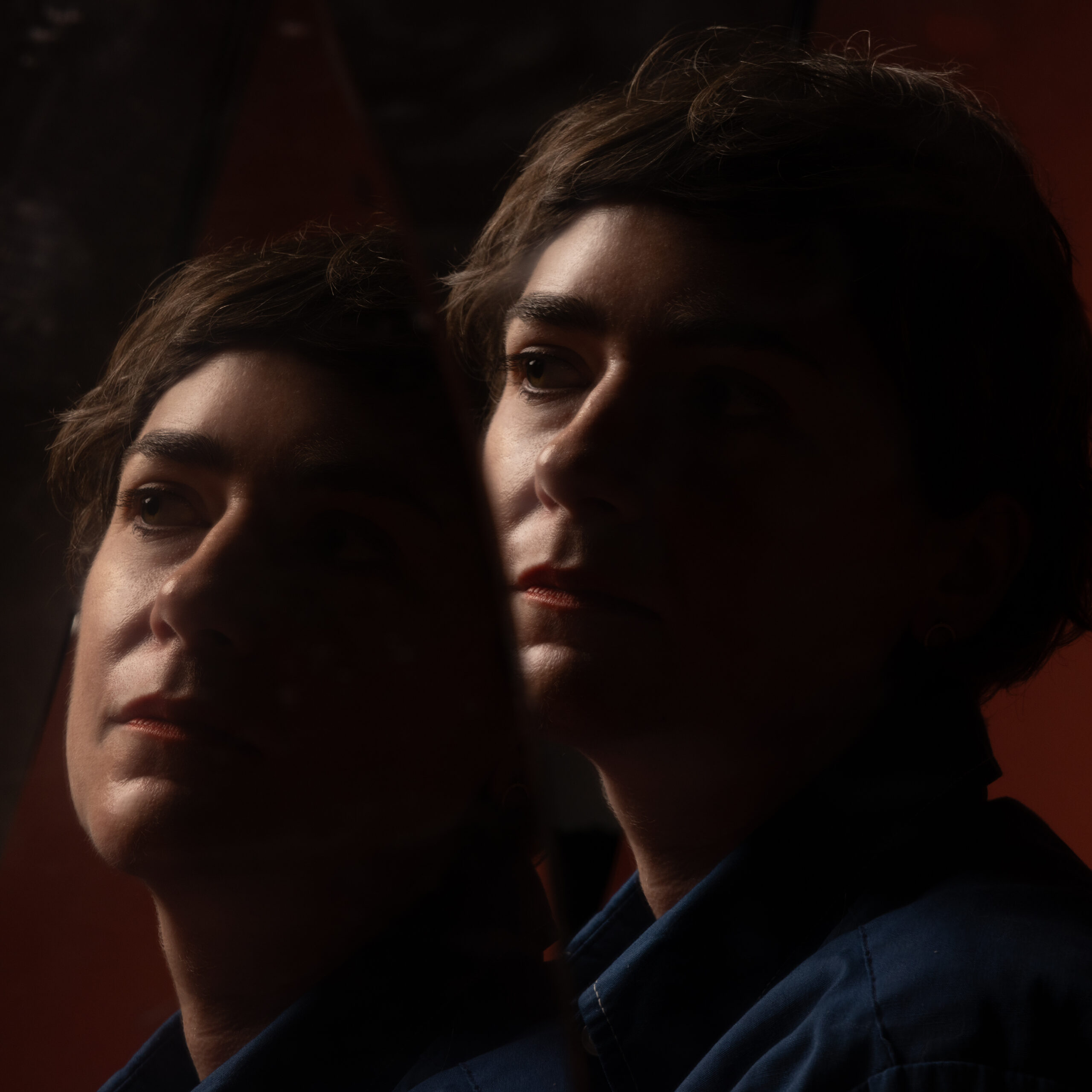The Guest List is a regular book column that surveys the reading habits of our favorite musicians. In this edition, Emily McBride talks with Caroline Sallee (stage name Caroline Says). Caroline’s latest album, The Lucky One, is out now via Western Vinyl.
Emily McBride: Are there any books that inspired the writing and recording of The Lucky One?

Caroline Sallee: I thought this would probably be a question. I read a lot of short stories while recording this, and I just have to say “A Good Man Is Hard to Find” is probably my favorite. Flannery O’Connor is a classic, and there’s a sense of humor to her writing that maybe isn’t evident at the surface level—it’s hidden behind darkness—which I hope translates into my songwriting. Listening to my songs, you might not think they’re funny, but I feel like there’s a sense of humor. That’s what I was reaching for.
I purposely try to find books about just normal people living normal lives, and so I read this book called Last Night at the Lobster by Stewart O’Nan. It’s about the manager of a Red Lobster in a small town. I can’t really say why I have this fascination with the suburbs. I guess I’m looking for emotional depth in places that are unexpected and a story about lives that aren’t celebrated. This is also a short book, and I really love a book I can read in a day.
Another very short book you can read in a day is called Crapalachia by Scott McClanahan. It’s about this guy growing up in rural West Virginia, his wacky family, and all the characters in his small town that were important to him. A biography of a place. It’s a memoir, I think. I guess with this album, I was going for a Southern Gothic feel. And I do think the South has a feeling to it. I was trying to tap into and sonically represent that somehow.
EM: Do you have an arsenal of books that you go to when you feel like your creative battery is low?
CS: I reach for a short story book and open a random page. I feel like one author who I’ve been doing that a lot with is The Collected Stories of Lydia Davis. They’re really short—for instance, I’m holding it right now, and there’s story that’s two sentences—it’s so cool that you can say so much and translate a feeling with so little.
Another author I can just pick up is one I discovered right after college. I was staying at a hostel, and I found a book of Ann Beattie stories called Secrets and Surprises. There’s one that I love where the characters catch fireflies and release them in a room. The imagery, something about it just feels magical.
One book I do want to talk about is Charlotte’s Web [by E. B. White]. I reread Charlotte’s Web one night, and I think that’s my favorite book of all time. I read it, and it made me cry for like an hour after. I mean, she dies. Spoiler alert.
EM: Oh, I remember that vividly. It is a beautiful book.
CS: Yeah! Just how you can spark that amount of movement with words. I guess that’s what I try to do with my music.
EM: What made you want to go back to it as an adult?
CS: I think I go through periods of not reading a whole lot, and I think that’s what I reached for when I decided I wanted to get back into reading.
I also reread Catcher in the Rye, which was a book I loved as a teen. I still think it’s an incredible book. It’s another example of a book that feels like you’re having a conversation with someone and it makes you realize how much you’ve grown and changed. I love J. D. Salinger.
EM: Do you think that’s one of the books that started your love of reading?
CS: Definitely. I feel like that’s probably the case for most people. I also wanted to talk about Daniel Clowes. I do love graphic novels, and I feel like Ghost World is another book about freaks in the suburbs that had a huge impact on me as a teen. It’s about freaks in the suburbs, and I really related to it as a weirdo in Huntsville, Alabama. I had one best friend, too, and we were both just these weirdo girls. We were basically Ghost World. I do cartooning as well, and it influenced my drawing style.
EM: In your writing, you’re very good at capturing the concept of looking back. I feel like you have like a treasure trove of little memory vignettes that you pull out and share. Do you have any books you admire that capture that same sense of reflection?
CS: One that just popped in my head is Just Kids by Patti Smith. That’s one of my favorite memoirs written by a musician. I think the way she writes every sentence has poetry in it. And I feel like that was just a beautiful tribute to Robert Mapplethorpe, and their time together and friendship and captures that period in her life.
EM: What are some of your other favorite books about music?
CS: One is another book you can read in one sitting: How to Write One Song by Jeff Tweedy. I thought it was incredible, and I recommend it to people who aren’t even songwriters. I do a lot of freewriting, which is something he talks about in the book. Set a timer for thirty minutes. It’s kind of like “morning pages” in The Artist’s Way [by Julia Cameron]. He gives you exercises that are really helpful. But he also talks about writing from different perspectives. Writing from an animal’s perspective, for example. He talks about how on [Wilco’s] A Ghost Is Born, every single song is written from an animal’s perspective, because he was trying to relate to his children. I got so much out of that book.
EM: So what are you reading right now?
CS: Right now I’m reading The Devil Finds Work by James Baldwin. I embarrassingly had never read James Baldwin. I started a short story club, and one person picked a James Baldwin story. It was called “Sonny’s Blues,” about a musician, and I loved it. I’m not very far into this other book, but I love the way Baldwin writes. It just feels like butter. The book is about a kid going to the movies, and all the whiteness in the movies at the time and how he experienced it as a Black person. I honestly think he could be one of my favorite writers.
EM: Any other books you want to shout out?
CS: Well, one book that I got to talk about—even though everyone talks about it—is David Berman’s Actual Air. There’s a big difference [between] poetry and lyrics. They’re not the same thing. I love that he was both an incredible lyricist and a poet as well.
Emily McBride is a music writer, previously serving as an editor at Paste Magazine and YouTube Music, as well as a freelance contributor to Consequence and Noisey. She currently resides in Portland, Maine and is on a lifelong quest to find the perfect michelada.

